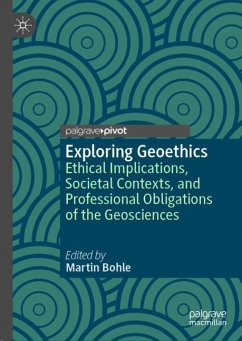
Bridges to Global Ethics
Geoethics at the Confluence of Humanities and Sciences
Herausgegeben: Di Capua, Giuseppe; Oosterbeek, Luiz

PAYBACK Punkte
19 °P sammeln!
This book contributes to the current discussion on geoethics and global ethics within the geoscience and humanities communities. It provides new content and insights into developing convergent human actions in response to global anthropogenic changes, based on perspectives that make it possible to combine geoscience knowledge with humanities and social sciences approaches. Selected authors present their reflections, findings and insights regarding the vision of geoethics (ethics of responsibility towards the Earth) as global ethics from philosophical, humanities and social sciences perspective...
This book contributes to the current discussion on geoethics and global ethics within the geoscience and humanities communities. It provides new content and insights into developing convergent human actions in response to global anthropogenic changes, based on perspectives that make it possible to combine geoscience knowledge with humanities and social sciences approaches. Selected authors present their reflections, findings and insights regarding the vision of geoethics (ethics of responsibility towards the Earth) as global ethics from philosophical, humanities and social sciences perspectives. In addition, they discuss ethical frameworks from diverse cultural traditions, searching for points of intersection with geoethics.
The goal: for global environmental problems to be managed via multi-perspective approaches that can more effectively accommodate complexity. Combining the strengths of the geosciences, humanities and social sciences can pave the way for a paradigmshift in how human societies develop adaptive, sustainable responses to environmental changes and societal inequalities.
The goal: for global environmental problems to be managed via multi-perspective approaches that can more effectively accommodate complexity. Combining the strengths of the geosciences, humanities and social sciences can pave the way for a paradigmshift in how human societies develop adaptive, sustainable responses to environmental changes and societal inequalities.














